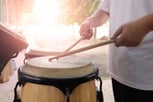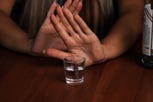Support groups are gatherings of people who discuss common problems and solutions. They give and receive support in times of trouble and celebrate their successes. A well-known addiction support group is Alcoholics Anonymous (AA). While this was the first addiction support group, formed to fight alcoholism, many other 12-step recovery and support groups have formed since that time.
Going to a support group is challenging the first time because addicts initially don’t want to talk about their addiction. Some attend meetings during addiction treatment or when ordered by courts if they get a DUI or arrest for drug-related crimes. However you get to your first meeting, the other members will welcome you. Group members give encouragement and praise for staying off drugs and alcohol while helping you recognize and steer clear of people and places that might lead to relapse.
Most members thrive on regular meeting attendance and participation. When new in recovery, members are recommended to attend three to five times per week. This can vary during times of stress or personal troubles. Long-term recovery members go to support groups two to three times per week to remain active, usually for life. Not everyone continues this practice, but dropping off can be seen as a red flag for relapse.
Why Do I Need a Support Group?
Many recovering addicts and alcoholics maintain abstinence in support groups. Some go to meetings and recover without treatment centers or recovery programs. They recognize the need for regular attendance, usually for life. Because this can be overwhelming for addicts, they recommend approaching recovery “one day at a time.” Taking life in small bites is easier than looking at the long-term work needed to recover--and to abstain. This is important when dealing with addiction, which does not end when drugs and alcohol are out of the addicts’ system. While some addicts may see support groups as a crutch, those in recovery view them as essential.
Furthermore, treatment programs invite addicts to find a support group because once treatment ends, life begins. In working through recovery issues, addicts need help to navigate the temptations of drinking and using when dealing with frustration, anger, resentment, anxiety or stress. After treatment, support groups can be attended daily, weekly, and monthly for years. The best parts are the relationships formed in support groups. Addicts have often isolated themselves from others, except to drink or use drugs in social groups. To remain clean and sober, it is good to find new friends who support recovery. Other friends and family want to help, but they do not understand the issues surrounding addiction and how to work through them. Addicts in recovery do!
Types of Support Groups:
ALCOHOLICS ANONYMOUS: Alcoholics Anonymous (AA) and other 12-step groups are the most common format for support groups. AA was started in 1935 when two men came together to help each other quit drinking. They discovered they could stay sober best when they met with and helped other alcoholics. This turned into meetings of sober alcoholics and began a movement that has changed the face of addiction around the world. Today there are AA meetings in every language all over the world. There is camaraderie and fellowship focused on recovery for every person who attends.
From AA have come Narcotics Anonymous, Pills Anonymous, Marijuana Anonymous, Cocaine Anonymous, Crystal Meth Anonymous, Heroin Anonymous and Nicotine Anonymous. These are 12-step programs dealing with specific drugs and recovery from addiction.
Other groups have formed when 12-step programs were not desired by recovering addicts. A brief description of each program is included here:
SMART RECOVERY: This group maintains meetings and online forums. They were formed to educate addicts. The program teaches addicts to retrain their brains after ending addiction and to empower them, without 12-step programs. Groups can be found on 14 different regional websites at www.smartrecovery.org.
LIFE RING SECULAR RECOVERY: This group is a growing force in the world of addiction recovery, with over 390 meetings worldwide. Started in Oakland, CA, the bulk of their meetings are in the Bay area. However, there are meetings in Colorado and as well as in other countries, including Denmark, Ireland, India and Canada. They focus on addicts learning to become more self-reliant and empowered. To find meetings and other information about this group, go to: http://lifering.org/.
MODERATION MANAGEMENT: This program focuses on managing alcohol and drinking before alcoholism occurs. Not focused on abstinence, MM teaches techniques for responsible decision making when drinking. Formulated to alter drinking behavior only, MM addresses problem drinkers, rather than those identified as alcohol dependent. The website at http://www.moderation.org/meetings/index.shtml, shows meetings located throughout the U.S. and Europe.
NARCONON: Started in 1966 by the Church of Scientology, Narconon's program focuses on teaching new methods for coping with life without drugs. It begins with detox from drugs done using repeated treatments in a low-heat sauna. By developing coping skills for the addict is the focus, abstinence is the eventual desired outcome in Narconon. Treatment centers are worldwide, and information is found at: http://www.narconon.org.
PAGANS IN RECOVERY: Based on spiritual principles that differ from 12-step recovery meetings, this group maintains abstinence by attending both types of meetings. More information is available at http://www.thepaganinrecovery.com/.
SECULAR ORGANIZATIONS FOR SOBRIETY: (SOS) is also known as Save Our Selves, began in Los Angeles, CA, more than 25 years ago by James Christopher. Some people are attracted to SOS because the focus on spiritual dependence for recovery found in 12-step meetings can be uncomfortable. Meetings are listed throughout the US and overseas at: http://www.cfiwest.org/sos/intro.htm.
WOMEN FOR SOBRIETY: Based on empowering women to recover from alcoholism and addictions, Women for Sobriety began in 1976. One woman in early recovery was uncomfortable with the 12-step premise of being powerless over her addiction began WOS. Using affirmations and positive statements toward personal responsibility and empowerment, WOS promises women they can manage and control addiction. WOS is found at: http://www.womenforsobriety.org/beta2/.
CENIKOR FOUNDATION: Based on a 1960’s prison program, Cenikor is a group of treatment programs where personal responsibility is the key for treatment, along with job skills’ and placement. Abstinence, accountability and personal development are the goals. They are found at: http://www.cenikor.org.
More and more group treatment options are available for those who want support in recovery. As more addicts gain success in other groups, membership increases and new types of meetings form. A good fit can be found for most any lifestyle.
If you or someone you know is seeking help with addiction, please visit our directory of treatment centers or call 866-606-0182 to start the path to recovery today.








